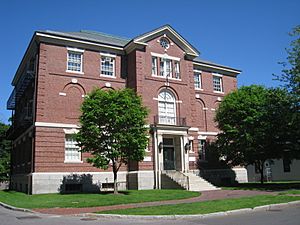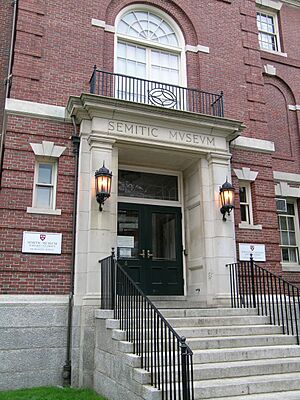Harvard Museum of the Ancient Near East facts for kids

HMANE occupies its 1903 building on the Harvard campus
|
|
| Former name | Harvard Semitic Museum |
|---|---|
| Established | 1889 |
| Location | 6 Divinity Avenue, Cambridge, Massachusetts 02138 |
| Type | Archeology |
| Architect | A. W. Longfellow |
| Owner | Harvard University |
| Public transit access | Harvard (MBTA) |
The Harvard Museum of the Ancient Near East (HMANE), once known as the Harvard Semitic Museum, is a fascinating museum that first opened its doors in 1889. It moved into its current home at 6 Divinity Avenue in Cambridge, Massachusetts, in 1903. This museum helps us explore the history and cultures of the ancient Middle East.
Contents
Discover the Museum's History
Building the Museum
The construction of the museum's building began on September 27, 1900. An architect named A. W. Longfellow designed the building. The work was finished in the spring of 1902. The museum then officially opened its doors to the public on February 5, 1903.
Times of Change and Reopening
The museum has closed and reopened a few times throughout its history. During World War II, from August 1942 to April 1946, the museum's spaces were used for other purposes. It closed to the public again from 1958 until 1982.
In October 1970, an incident occurred on the third floor of the museum. This caused the museum to be temporarily closed. It reopened in April 1982, and the president of Harvard at the time, Derek Bok, spoke at the reopening ceremony.
In December 2012, Harvard University created a new group called the Harvard Museums of Science and Culture. The Harvard Museum of the Ancient Near East joined this group. Other museums in the group include the Harvard Museum of Natural History and the Peabody Museum of Archaeology and Ethnology.
A New Name and Virtual Tours
In April 2020, the museum's director, Peter Der Manuelian, announced an important change. The museum's name officially became the Harvard Museum of the Ancient Near East (HMANE). He explained that this new name better describes what the museum is all about. It helps people understand that the museum focuses on the ancient cultures of the Near East.
Around the same time, the museum also launched a "virtual tour." This allowed people to explore the museum's collections and artifacts online. This was especially helpful when the physical museum was temporarily closed. Now, visitors can still see many amazing objects in great detail from anywhere.
 | James Van Der Zee |
 | Alma Thomas |
 | Ellis Wilson |
 | Margaret Taylor-Burroughs |


